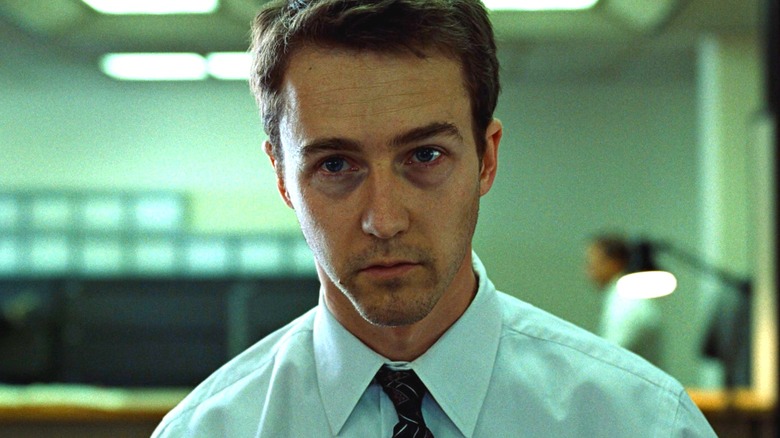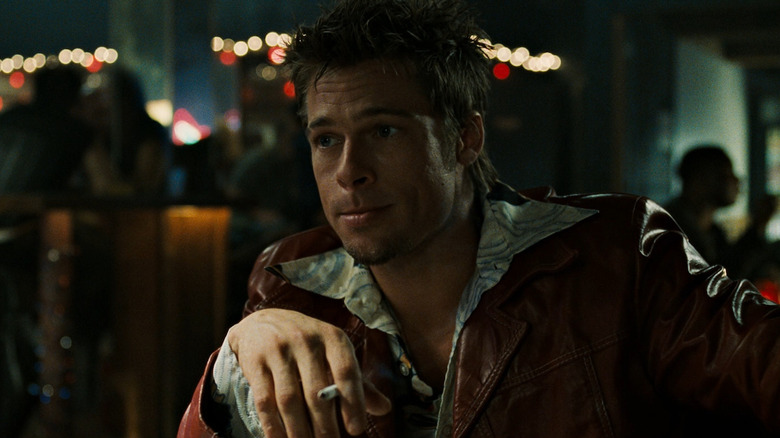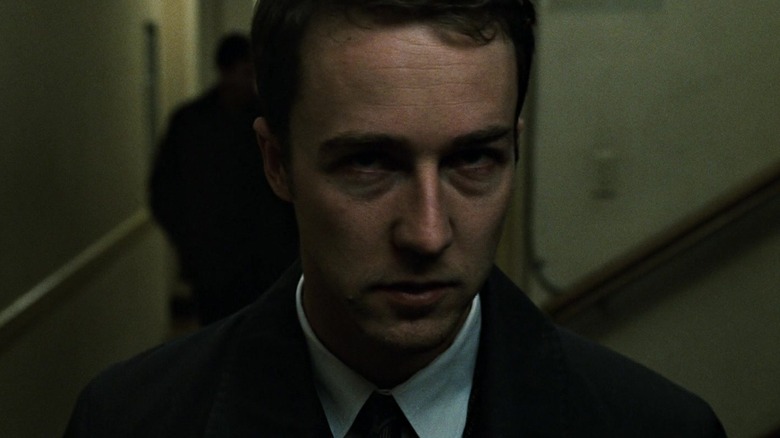David Fincher Called The First Draft Of Fight Club 'Pathetic' (For A Good Reason)
David Fincher's 1999 comedic thriller "Fight Club" has become a somewhat controversial part of our pop culture landscape in the more than 25 years since its release, but originally, the film's screenplay had significantly less bite. Speaking to The Guardian at a British Film Institute (BFI) event in 2009, Fincher shared that the original script for "Fight Club" lacked the voice-over that would one day become one of the movie's trademark identifiers. "Fight Club" just wouldn't work without star Edward Norton's voice-overs as the pitiful protagonist, a sad sack insurance company number cruncher known only as "the narrator" or "Jack," based on his habit of referring to himself as Jack's various body parts based on a magazine article he reads. The narration not only gives us an acerbic perspective on why Jack does the things he does, but it also gives the movie much of its satirical edge.
In Chuck Palahniuk's novel "Fight Club," upon which the movie was based, the story is told entirely in the first person from the narrator's point of view. Trying to translate first-person books to movies can be tricky as is, and narration doesn't always work (the theatrical cut of "Blade Runner," anyone?), but "Fight Club" without the narrator's snarky voice-over would be, as Fincher put it, "pathetic."
Jack's narration is a vital part of why Fight Club works
Fincher was not kind when describing the first draft of the "Fight Club" screenplay, saying:
"So, we hired Jim Uhls, who went off and wrote a draft of the screenplay that didn't have any voiceover in it. I read it and said, 'This is sad and pathetic. It's just sorrow and people being horrible. Where's all the stuff where he talks about what he's thinking?' And he said, 'Oh, that's kind of a crutch.' And I said, 'No, man, that's our only chance at being sarcastic and satirical.' So, he went back and put all that in."
Thank goodness for Fincher's understanding of the film's need for comedy, because without the narration, it's really, really depressing. Unfortunately, even with that sense of humor, many "Fight Club" fans still totally missed its point (Brad Pitt's Tyler Durden is not the hero of the story, no matter how cool he may look), which is something that has bothered Fincher since the movie's release. It can be easy to identify with Norton's version of the narrator; despite the fact that he's a creep who attends support group meetings for illnesses he doesn't have, he has the same kind of gallows humor that many use to survive. (Well, that and he wants to punch Jared Leto's character, and who can blame him?) Without that, though, he's just a loser who gets caught up in extremist violence when he meets Tyler on a flight and the latter starts imparting his radical views onto the lonely Jack.
Fincher's instincts saved Fight Club from failure
The movie version of "Fight Club" is one of those rare adaptations that is even better than the source material, and a large part of that is Fincher leaning into the satire of it all. While it can be a little difficult to extricate which of Durden's beliefs Palahniuk actually believes in the original novel (which is a problem since some of them are deeply harmful), Fincher seems to fully understand the lure of Tyler Durden without being beholden to the character himself. The director's "Fight Club" adaptation is also layered and nuanced, taking some of Palahniuk's best ideas and most quotable lines from the book and making a movie that's a smarter critique of it all. And that all starts with Jack's inner dialogue, which gives us greater insight into exactly what kind of disaffected man might fist-fight strangers for fun.


